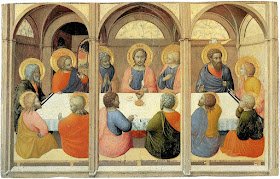
The Descendants' Matt King has been so busy with his law practice and the handling of his family's hereditary estate on Kauai that he hasn't had much time for his family. Now his wife, Alexandra, is in a coma in the hospital after a boating accident and he hopes that when she recovers, he can begin to make up for past mistakes. Before very long we learn two things: she's been having an affair with someone whom she wants to marry, and she is going to die. Throughout the rest of the movie, Matt and his 16 and 10 year old daughters try to come to terms with Alexandra's life and death, and to rebuild their relationship with one another. In the end they succeed, and the final scene shows the three of them snuggling together on the couch, eating popcorn and watching TV.
It's a beautiful (scenically), well-made movie and the actors play their parts well, but there is an emptiness throughout the movie. After Alexandra dies, there is a scene in which Matt and his daughters take her ashes out in a canoe and dump them into the ocean. There's an "is that all there is?" feel to the scene. She was alive and now she's gone, and that seems to be it. There's no promise of anything beyond this life, and one wonders what can possibly hold the family together now.
The movie opens with the funeral of Walt Kowalski's wife. Kowalski (Clint Eastwood) stands stern and unmovable as guests file by the casket. During the funeral, the young priest, Fr. Janovich, gives a rather pat homily that might do for a family whose faith is important to them, but is powerless to touch or console Dorothy Kowalski's family. It becomes quickly obvious that there is only the most tenuous of relationships between Walt and his two sons and their families, and that this is unlikely to change.
Walt is a Korean War veteran and he is angry. The world around him is changing and he doesn't like the changes. His neighborhood is now filled with Hmong refugees. He has nothing to say to his neighbors and they have nothing to say to him. So, he sits on his porch, drinking beer and scowling at the world.
Not only is Walt unhappy with his neighbors, but Fr. Janovich is making his life difficult. Father made a promise to Dorothy that he would get Walt to go to Confession, and he is determined to keep his promise. I like this character. He is naive and sometimes gauche, but he is also brave and faithful
Events conspire to involve Walt in the lives of his next door neighbors, a young woman named Sue and her brother Thao. It's his growing affection for these two young people and the wider Hmong community that brings Walt back into the land of the living. It's his efforts to help Thao find his way in the world and escape the clutches of the gang that is trying to recruit him that bring him to the point where he must face the demons of his years in Korea, and risk everything to save his friends.
Unlike The Descendants, Gran Torino is filled with hope. In fact, the characters in one way or other display all the virtues, both theological and cardinal. It's a bit rougher around the edges (Oh, who could imagine Clint Eastwood rough around the edges?), but it tells a story of true reconciliation.
One warning, is that Gran Torino is filled with language that will manage to offend almost everyone. It's not only crude, it's decidedly not PC. I don't find this as offensive, though, as the language of the daughters in The Descendants. It's very irritating, but it's pretty much what we have come expect from children in movies nowadays.
AMDG
























